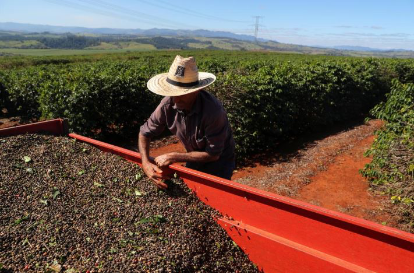South American coffee growers may delay harvest this year and limit the number of workers they employ as the novel coronavirus pandemic continues to spread, threatening to reduce this year’s crop of export-quality beans.
SEE ALSO: Dozens Dead in Brazil Floods as Officials Warn of more Landslides
The pandemic has killed more than 250,000 people and upended food production worldwide.
Meat processing plants where outbreaks have occurred are closed; truckers have curtailed deliveries for fear of infection and farmers are destroying crops that they cannot get to consumers.
Harvesting is the most labour-intense component of coffee production.
Colombia and Brazil, which produce 65 per cent of global arabica, the premium grade of coffee, will need around 1.25 million people, according to growers associations.
They, along with Peru and Ecuador, rely on temporary workers for fieldwork.
Farmers, coffee traders and importers in top-consuming countries are concerned that the virus has not peaked in either Brazil or Colombia, and bringing workers together for harvest risks worsening the outbreak.
Brazil’s right-wing President Jair Bolsonaro has downplayed the seriousness of the virus, criticised regional movement restrictions and pressed for businesses to reopen, even as the country has recorded more than 135,000 cases and near 10,000 deaths, the most for an emerging market nation.
Speciality coffee trader, Caravela Coffee, conducted a phone poll with hundreds of associated growers in Peru, Ecuador and Colombia late in April.
Most of them said they expect difficulties in hiring workers, adding that they might see losses of up to 10 per cent in the production of export-quality arabica.
High-end coffee brands such as Starbucks, Nestle-owned Nespresso and Italy’s Illycaffe prefer washed arabica beans, while robusta, produced mostly in Vietnam, is widely used for instant coffee.
Robusta’s harvest is over, but arabica picking is just beginning in South America.
In Brazil and Colombia, local governments have exempted some workers from restrictions on movement in order to avoid hurting food production, including coffee or port operations.
Coffee deliveries rose 2.4 per cent in March in Brazil, the latest month for which data is available, though exports are expected to have declined since.
Prices rallied in March before declining nearly 10 per cent in April.
Farmers in Brazil said they are looking to hire fewer people and harvest gradually
Several farmers told Reuters that they are considering delaying harvest due to worries about infection.
“I will start with fewer people than normal, we might go slower in the beginning,’’ said Minas Gerais grower, Paulo Armelin, a regular supplier for Italy’s Illy.
Some officials have asked producers to delay the harvest for at least a month, which is not desirable if they want to pick the coffee cherries – the fruit that contains the beans – when they are ripe, a prized quality aspect for arabica.
Harvesting the beans later when they are dry still makes good coffee, but not the top export quality sought by mainstream roasters.
“It has been hard to find protection equipment.
“We will start the harvest, but if people start to get sick I will stop and resume later,’’ said producer Thiago Motta, owner of Jatoba farm in the Cerrado region of Brazil’s Minas Gerais state.
In Colombia, where farms are smaller and in mountainous areas, the harvest is mostly manual and demands many people in the coffee fields.
Most production is done by families, who can bring in neighbours to help, which could reduce the need to bring people from other areas.
The country has reported fewer than 10,000 cases of coronavirus, but testing is not widespread.
Colombia’s coffee federation said temporary workers still are needed for much of the harvest.
Moving and housing some 150,000 workers in sanitary conditions will be difficult for growers, as will ensuring beans are being processed and shipped on time.
In April, coffee export in Colombia was down 32 per cent from the year-ago period due to restrictions put in place.
Jhon Espitia, who comes from a family of coffee growers in Tolima, in central Colombia, said the government’s guidelines on how to conduct harvesting under current conditions have not been clear.
“It’s a very worrying situation because in some areas the harvest has already begun and in 15, 20, 30 days it will be in full swing,’’ he said.
Transport could also be a problem.
Trucks are used to take coffee from farms to warehouses in nearby cities, where selection takes place and lots are separated before it is loaded for delivery to ports.
There has been a reduction in the availability of trucks since some drivers prefer to stay home to avoid the contagion.
The movement of trucks between cities could also increase risks.
Dean Cycon, CEO of mid-sized U.S. coffee roaster, Dean’s Beans, said from his conversations with suppliers all over Latin America, that transportation is the largest concern.
“We could see port operations slowing down, or problems with trucks getting the coffee at farms,’’ he said.

